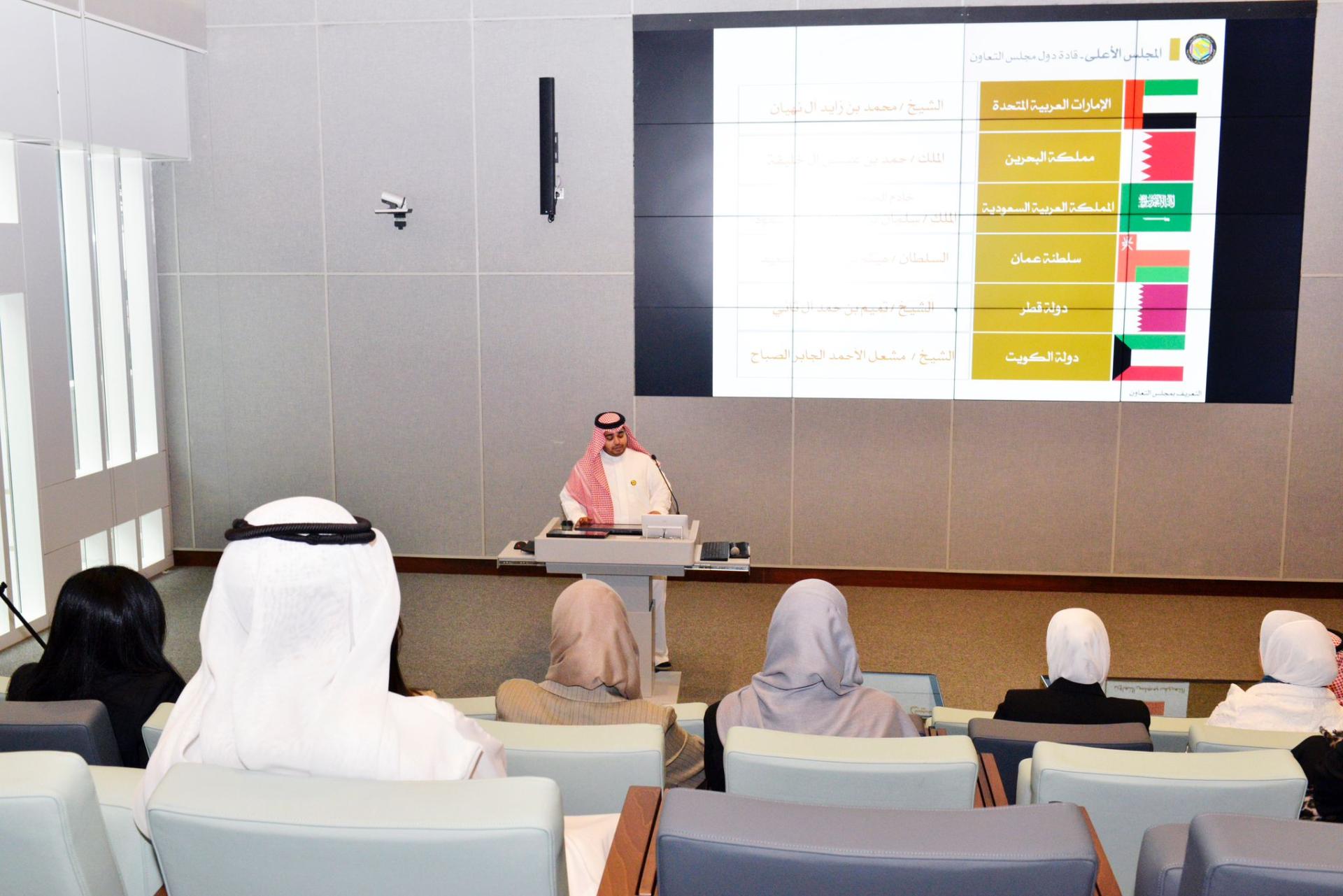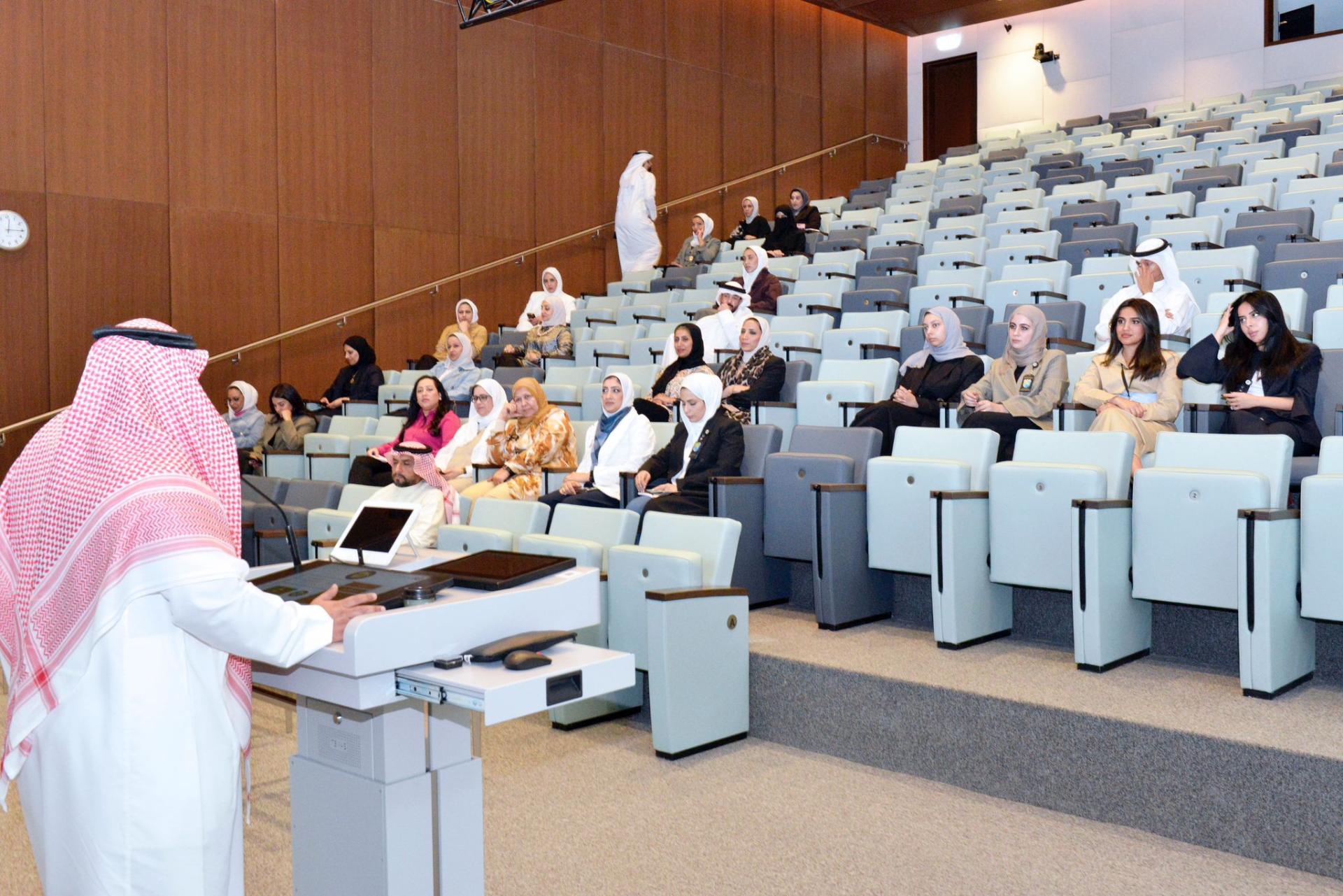
Kuwait University, in Collaboration with the International Organization for Women Empowerment and Capacity Building (Tamkeen) and Abdullah Al-Salem University, Organized the 51st International Conference Entitled "Gulf Community Issues in the Age of Artificial Intelligence: Opportunities, Challenges, and Prospects for Development."
The Gulf and Arabian Peninsula Studies Center at Kuwait University, in collaboration with the International Organization for Women Empowerment and Capacity Building (Tamkeen) and Abdullah Al-Salem University, held the 51st International Conference under the titled “Gulf Community Issues in the Age of Artificial Intelligence: Opportunities, Challenges, and Prospects for Development,” under the patronage and attendance of Acting President of the Gulf and Arabian Peninsula Studies Center and Conference Director, Prof. Yaqoub Al-Kandari, President of the Tamkeen Organization and Conference Secretary-General, Ms. Ibtisam Al-Qoud, and Chair of the Scientific Committee and Vice President of Tamkeen, Prof. Abdulwahab Al-Hayes. The conference took place over three days, from November 25 to November 27, aiming to spread social culture in the age of artificial intelligence.
The conference included five discussion sessions. On the first day, two sessions were held focusing on social issues concerning the age of artificial intelligence, as follows:
The first session, entitled "Anticipating the Risks of Artificial Intelligence on Gulf Societies," was chaired by Prof. Baqir Al-Najjar. In this session, Prof. Hanan Kamel, Dean of the College of Arts at Ain Shams University in Egypt, discussed the impact of cultural inflation on values of loyalty and national belonging in the age of artificial intelligence. Additionally, social work professors from Sultan Qaboos University in Oman, Dr. Wafa Al-Maamari and Dr. Magdy Abdrabah, along with Assistant Professor Dr. Tamader Al-Atrous from Kuwait International University, discussed deepfake as one of the cybersecurity threats enhanced by AI, exploring preventative measures for its impacts on Gulf societies. Prof. Mustafa Al-Amin from Hamad Bin Khalifa University in Qatar addressed the challenges of social empowerment in the Gulf, offering an Islamic perspective on sustainable development. Dr. Dakhil Al-Houti and Khaled Al-Hatem from the College of Basic Education discussed Gulf community issues in the age of AI: opportunities, challenges, and prospects for development. Prof. Ali Al-Ibrahim from the Regional Network for Social Responsibility in Qatar presented inspiring experiences in the application of AI to human capacity building.
The second session, entitled "Issues of People with Disabilities in the Age of Artificial Intelligence," was chaired by Dr. Salwa Al-Jassar from the College of Education at Kuwait University. In this session, Dr. Ahmed Al-Fawayer and Intisar Al-Kalbania from Nizwa University in Oman discussed the reality of using AI applications to integrate students with disabilities at Nizwa University. Dr. Ashraf Hussein and Dr. Mohammed Al-Rashaida from the College of Education at the University of the United Arab Emirates addressed the role of modern educational technologies in integrating visually impaired students in public schools in Abu Dhabi. Dr. Asmaa Saadi, Rofia Saadi, and Nora Guenifa from the University of Sharjah in the UAE discussed political empowerment and the challenge of the Gulf woman’s entry into outer space: an analytical reading. Dr. Fatima Al-Kalbani and Dr. Wafa Al-Maamari from Sultan Qaboos University in Oman discussed the perspectives of practitioners working with individuals with autism spectrum disorder regarding the effectiveness of using AI technologies. Ms. Amal Al-Bakri Al-Baili and Dr. Abdullah Al-Anzi from the Sustainable Development Center at the Kuwaiti Bar Association discussed the topic "Towards a Wise Social Policy in the Age of Artificial Intelligence."
On the second day, the third and fourth sessions were held. The third session, entitled "The Future of Gulf Societies in the Age of Digitization and Artificial Intelligence," was chaired by Dr. Tefla Al-Ajmi from the College of Social Sciences at Kuwait University. In this session, Prof. Hatem Abu Al-Nil, Professor of Greek Theater and Vice Dean of the Faculty of Arts at Ain Shams University in Egypt, spoke about the role of digital technology in developing Kuwaiti theater. Dr. Sufian Al-Tayeb Abdulqader from Sultan Qaboos University in Oman presented a case study of Oman on "Economic Diversification and the Transition to Clean Energy in Hydrogen-Dependent Countries: Who Leads Whom? Ms. Noura Al-Merri, a cybersecurity researcher and associate professor in the Department of Computer Science and Engineering at Qatar University, discussed inspiring Gulf models in the field of economic development: Qatar's experience in innovation and entrepreneurship. Ms. Natalie Vanderhorst, Deputy Economic Affairs Advisor at the U.S. Embassy in Kuwait, spoke about integrating and empowering women in the digital workforce. Prof. Sarah Ahmed from the University of Suez, Egypt, discussed the future of marriage in the age of AI technology. Dr. Rehab Mohamed from Assiut University, Egypt, spoke about the outlook for young people in the Gulf in light of the new global system's characteristics.
The fourth session, entitled "Employing Digitalization and AI in Developing the Educational Process," was chaired by Dr. Mohammed Al-Haddad from the College of Social Sciences at Kuwait University. In this session, Prof. Bader Al-Saqae from the College of Basic Education in Kuwait discussed the digital transformation of the education system in Kuwait: reality and expectations. Prof. Emad Farouk and Dr. Wafa Al-Maamari from the College of Arts and Social Sciences at Sultan Qaboos University in Oman presented on the challenges and risks of using AI in university education. Dr. Pawan Mishra, Xin Mio, and Ali Nadaf from Alef Education in the UAE discussed the impact of AI-driven adaptive learning programs on student learning outcomes in the UAE and bridging the math gap through a quasi-experimental evaluation of an AI-driven math pathway in UAE K12 education. Dr. Reem Al-Haji from the University of Sharjah, Dr. Aisha Al-Yamahi, an education leader and strategic consultant at Alef Education, and Dr. Afra Al-Mansouri from the Higher Colleges of Technology in Abu Dhabi, UAE, discussed harnessing AI for educational advancement, reflecting on policies, practices, and teaching methods in the UAE's Ministry of Education. Dr. Nasser Al-Mazidi and Dr. Moza Al-Shiyadi from Nizwa University in Oman discussed cybersecurity requirements at Nizwa University in accordance with ISO standards and their relationship with AI from the perspective of education students. Dr. Abbas Al-Tarrah, President of the Kuwaiti Coaches Without Borders Association, spoke about challenges in work and employment in the context of advancing AI technologies. Dr. Salah Abdulrahman from Bahrain discussed the use of technology and AI in developing businesses and improving Gulf institutions, highlighting opportunities and challenges.
On the third and final day, a panel discussion and the closing session were held. The panel discussion, entitled "Cybersecurity in the Gulf States," was chaired by Dr. Khaled Al-Anzi, Deputy Director of the University for Informatics and Digitization. In this session, Major Dr. Bader Al-Khubizi discussed cybercrimes, their patterns, risks, and ways to face them. Dr. Safaa Zaman, a faculty member at Kuwait University, spoke about the relationship between cybersecurity and AI. Lieutenant Abdullah Abdulwahab and the head of the Cybersecurity Center in the Gulf Cybersecurity Association, Attorney Al-Mas Booqmaz, addressed cybersecurity from a legal perspective. Mr. Nabil Al-Obaidi discussed cybersecurity challenges and digital governance, while Dr. Bader Al-Shallal spoke about the exchange of security knowledge and expertise in cybersecurity. Eng. Nayef Al-Awadhi, a computer system engineering specialist at the Public Authority for Communications and Information Technology, discussed cybersecurity and advanced technologies for AI applications, while Eng. Mishaal Al-Zaid from the National Cybersecurity Center and Amr Ezzedine discussed AI governance.
The conference concluded with a closing session delivered by Ms. Ibtisam Al-Qoud, President of Tamkeen Organization and Secretary-General of the Conference, with the presence of Acting Director of the Gulf and Arabian Peninsula Studies Center and Conference Director Dr. Yaqoub Al-Kandari, Chair of the Scientific Committee and Vice President of Tamkeen, Prof. Abdulwahab Al-Hayes, and Dr. Salwa Al-Jassar from the College of Education at Kuwait University.
The conference concluded with several recommendations:
1. Establish laws and regulations to govern the use of AI, by applying controls to ensure proper and conscious employment.
2. Expand training and qualification programs in the field of training courses and workshops across all sectors to meet future demands.
3. Include future job skills in university education programs.
4. Reconsider public policies in countries to enable automation in governmental job structures in public sectors.
5. Require universities and educational institutions to provide services and facilities for people with special needs.
6. Promote the culture of generative AI that mimics hacking programs.
7. Allocate financial resources to support research on AI.
8. Encourage ethical innovation that aligns with laws and societal norms.
9. Launch initiatives to protect children and youth from AI risks.



 Colored
Colored Grayscale
Grayscale

